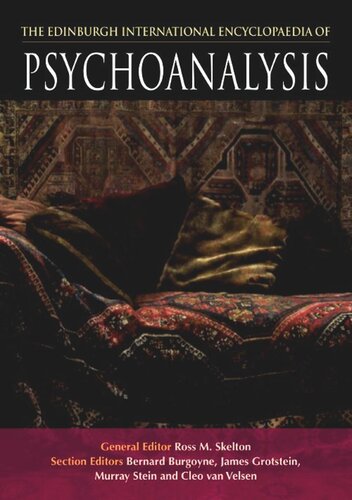

Most ebook files are in PDF format, so you can easily read them using various software such as Foxit Reader or directly on the Google Chrome browser.
Some ebook files are released by publishers in other formats such as .awz, .mobi, .epub, .fb2, etc. You may need to install specific software to read these formats on mobile/PC, such as Calibre.
Please read the tutorial at this link: https://ebookbell.com/faq
We offer FREE conversion to the popular formats you request; however, this may take some time. Therefore, right after payment, please email us, and we will try to provide the service as quickly as possible.
For some exceptional file formats or broken links (if any), please refrain from opening any disputes. Instead, email us first, and we will try to assist within a maximum of 6 hours.
EbookBell Team

4.7
106 reviewsThe one thousand entries in the Encyclopaedia provide the best single volume coverage of psychoanalysis available. With its wide, objective and catholic vision, the Encyclopaedia demonstrates that psychoanalysis is a single discipline, very much greater than any particular movement, school or individual, including its founder, Freud. Thus the book contains authoritative entries on all the most important authors, practitioners, concepts, movements, schools, debates and controversies in psychoanalysis and its offspring, past and present.
A précis essay is given of each school amplified by explanations of all key terms within that school. Entries are alphabetically arranged, fully cross-referenced, many with suggestions for further reading. Most importantly the book features both contributors and entries reflecting the various disciplines such as Feminism, Literature, Philosophy, Art and Anthropology that have contributed to the development of psychoanalysis or been influenced by it.
Besides an immense array of topics on psychoanalysis contributed by psychoanalysts themselves, there are also entries on many topics written by psychiatrists, psychologists, psychotherapists, philosophers, medical researchers, historians, literary critics, anthropologists, linguists and other specialists. International in scope, the Encyclopaedia also draws on a geographically wide field of authors.
The Encyclopaedia caters for readers who require knowledge at a glance as well as those seeking a more detailed account. Besides concise definitions, it includes numerous illuminating longer essays by distinguished contributors including: Peter Fonagy, Michael Eigen, James Grotstein, Eric Laurent, Thomas Ogden, Paul Roazen, Hazel Barnes, Charles Brenner, Marcia Cavell, Morris Eagle, Murray Stein, Allan Schore, Robert Stolorow and Robert Wallerstein.